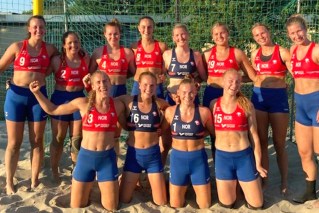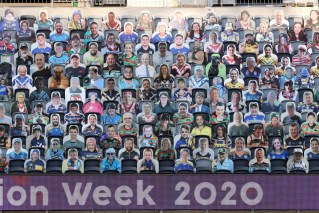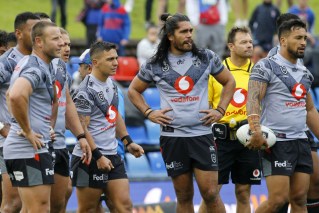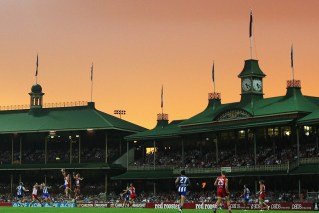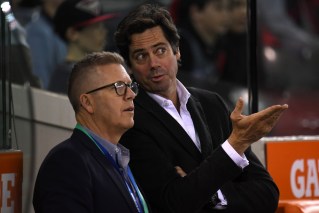Leading Teams: The program behind so many Australian sporting success stories

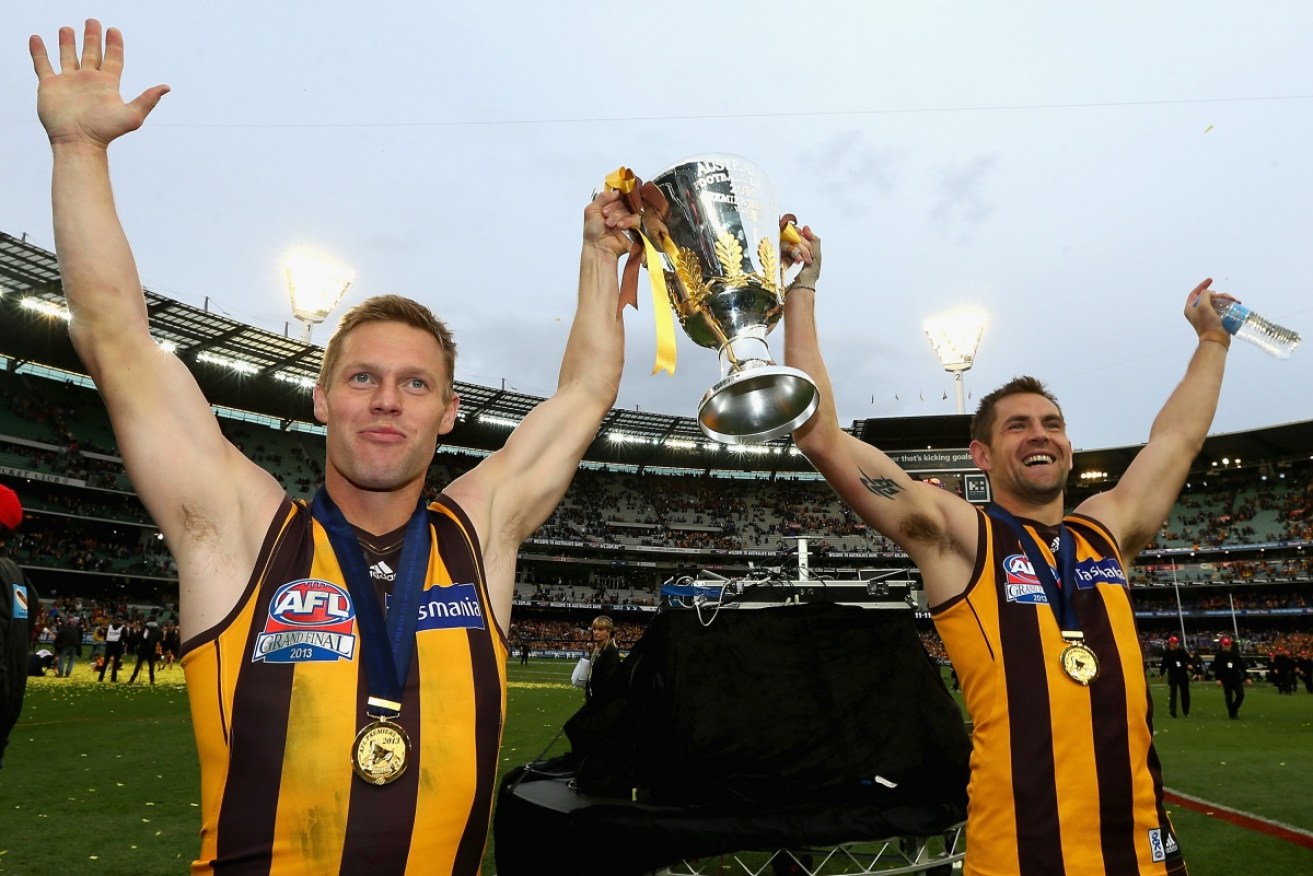
Key Hawthorn figures say a Leading Teams meeting was crucial to an era of success. Photo: Getty
Luke Hodge remembers it like it was yesterday. The search for answers. The initial shock. The acknowledgement that change was needed.
In the tourist hotspot of Mooloolaba on Queensland’s Sunshine Coast, Hawthorn players were attempting to dissect the club’s 2012 AFL grand final loss to Sydney, a result that came just a year after an agonising three-point preliminary final defeat to Collingwood.
Hodge, as fiercely proud as he is competitive, said the “chokers tag” attached to the club was burning inside him.
Coach Alastair Clarkson was seeking answers, too, and called in ‘Leading Teams’, the football industry-popular organisation focused on leadership and high performance, for what co-founder Ray McLean called an “audit”.
McLean, who has worked with sporting teams across every major code in Australia, had spent time with the Hawks before.
But as he always does, he started with a series of what he calls “pivotal early questions”, asking players how they think they are viewed by opposition sides, how they want to be perceived and what behaviours are accepted by the group that shouldn’t be.
It triggered a fascinating response from an unlikely source who, at that point, had never played for Hawthorn, and only ended up playing once in the brown and gold.
McLean split the players into groups in the foyer of a hotel and asked them to report back with answers.
Like Hodge, he vividly remembers rookie ruckman Luke Lowden doing so in “confronting” fashion.
“Luke Lowden stood up and said, ‘you leaders always say ‘do the team thing, give off the easy ball,’ but when it gets to the big games, you don’t do it’,” Hodge told The New Daily.
“For a young guy to say that to a lot of the senior guys – that was a massive eye-opener.”
Lowden – who later moved to Adelaide but never played at AFL level for them – also queried the worth of the club’s behavioural trademarks as they stood.
“He effectively said, ‘why should we worry about this document, when you don’t do [follow] it?’ … he was quite strong in his view,” McLean told The New Daily.
Hodge said: “We broke everything down and said we needed to set standards and expectations … that 2012 grand final taught us to do the right things at the right times and anything’s possible.”

Losing the 2012 grand final spurred Hawthorn on. Photo: Getty
Hawthorn finished the camp with a series of six trademarks, insisting every player must live an elite lifestyle, respect all, have a selfless attitude, leave their ego on the hook, have open and honest conversations involving giving and receiving feedback when the time is right, and display a fight-to-the-death attitude.
While talk can be cheap, Hodge, now playing at Brisbane, has “no doubt” the meeting helped Hawthorn win three successive premierships from that point.
And he cites the 2013 preliminary final against Geelong, where the Hawks came from 20 points down at the last change to break an 11-match losing streak against the Cats, as one of his two proudest moments in football.
And it is not because the ‘Kennett Curse’ ended, instead nominating the match due to the fact the Hawks stuck to their trademarks when it really counted.
“We stuck together, we kept doing the right things and Geelong started to go against their style,” he said.
“I am so proud of that game and how the boys learnt from their mistakes.
“You lose those games and the whole Hawthorn dynasty doesn’t happen.”
What is Leading Teams?
McLean – a former school teacher and analyst for the Royal Australian Air Force – started consulting about performance and leadership for SANFL club Central Districts in 1992.
And when results started improving dramatically, intrigue surrounding the program led to a big break in 1994 with AFL club St Kilda.
It was there that McLean convinced coach Stan Alves of the merit of having a leadership group instead of a sole captain.
“Stan was punished by the media for that because the view was you didn’t need these bull—t groups and it was the captain [and nothing else],” McLean said.
But a paradigm shift in Australian sport followed and McLean counts that, and helping establish Sydney’s famed ‘Bloods culture’, as two of his career highlights.
Leading Teams has worked with 16 of the 18 AFL clubs at some stage, with many key Geelong figures crediting the program for helping them to three premierships from 2007 to 2011.
It is far from an AFL thing, though, with cricket teams, rugby league sides and referees and the Diamonds, Australia’s women’s netball side, all currently using Leading Teams.
The philosophies also apply to the business world, where NAB, Crown and Ray White count as some of the organisation’s corporate clients.
The misconception
A key plank of the Leading Teams program in a sporting sense is both players and coaches getting positive and negative feedback on performance and behaviour in a group setting.
The idea is that everyone is ‘equal’ and there is no hierarchy structure, meaning the likes of rookies, such as Lowden, and veteran players and coaches have equal say.
Receiving negative feedback can be quite confronting for some and occasionally, key football figures, foreign to the idea and program, found it hard to digest.
Former Brisbane and Western Bulldogs star Jason Akermanis likened the ‘360 feedback’ to workplace bullying, while super coach Mick Malthouse thought it could be degrading.
But being able to accept and embrace open and honest feedback is central to a successful team, according to McLean.
“[In the past] at a sporting club, if you had a problem, you might address it after a few beers,” he said.
“You might joke about it and hope someone gets the joke … but these are genuine conversations and they can take many different forms.
“There are so many positive examples of the power of that peer review … when your peers challenge you, you often get a better response than if the coach says: ‘You need to do this.’

McLean has enjoyed working with the Diamonds. Photo: Getty
“I think what it really appeals to is [an athlete’s] desire to be a part of the team and when a team has said ‘we want you to do this’, very few have responded negatively.”
McLean was also keen to emphasise that while sessions consisting of negative feedback are most commonly reported on, there are several examples of the opposite.
“It’s not always about holding people to account, it’s about rewarding them [too],” he added.
“It’s always the darker side that gets reported but there’s a really positive and uplifting side to it as well.
“I ran an exercise with the Diamonds this week and just used a couple of players in the session and asked ‘why do we love playing with this particular player?’
“It was really emotional and just a lovely exercise … it was wonderful.”
McLean, described by former AFL player and coach David Parkin as having “possibly done more for leadership in its broadest terms in this country than any other one person that I know,” acknowledges his program hasn’t worked everywhere.
He cites an example with the Australian cricket team where there wasn’t “much buy-in” from the group, and said without that, his work cannot be done.
But history would show that is a rare example.


